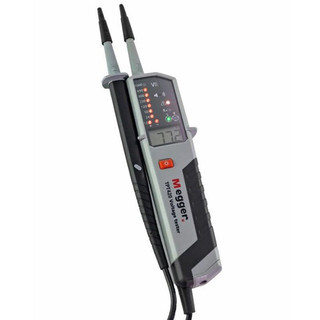Digital Detectors, Sensors & Testing
Continuity testers are essential for ensuring electrical circuits are complete. Whether you're checking a fuse box or tracing wires, these tools pinpoint issues fast.
Forget guesswork; these testers are built for precision, helping electricians, sparkies, and maintenance teams quickly diagnose faults. From simple continuity checks to advanced multi-meter functions, these tools are indispensable for electrical installations and repairs. Get the right tester for your needs and ensure every circuit is safe and sound.
What Jobs Are Continuity Testers Best At?
- Tracing circuits in a cluttered fuse box to ensure no connection is missed during maintenance or installation.
- Checking the integrity of cables in both domestic and commercial settings, ensuring they are fit for purpose.
- Identifying breaks or shorts in wiring behind walls, saving time on fault finding and repairs.
- Testing electrical outlets and switches to confirm they are live and functioning correctly before use.
Choosing the Right Continuity Tester
Sorting the right continuity tester is simple: match it to the job, not the other way around.
1. Simple vs Multi-Function
If you're only checking basic circuits, a simple continuity tester will do. For detailed diagnostics, opt for a multi-function tester that includes voltage and current measurements.
2. Display Type
Digital displays offer greater accuracy and are easier to read in low-light conditions, while analogue displays provide a quick visual reference for simpler tasks.
Continuity Tester FAQs
How does an electrical pen tester work?
An electrical pen tester detects voltage presence through a non-contact method. It senses the electric field produced by live wires, alerting you with a light or sound.
How to test a voltage pen?
To test a voltage pen, hold it near a live wire or outlet. It should light up or beep if voltage is present. Always test on a known live circuit first to confirm functionality.
What are the three types of testers?
The three main types of testers are continuity testers for circuit checks, voltage testers for detecting live wires, and multi-meters for a range of electrical measurements.
Who Uses These Kits?
- Sparkies and electricians who rely on accurate readings for safe installations and repairs.
- Maintenance teams needing quick diagnostics to minimise downtime in commercial settings.
- DIY enthusiasts performing upgrades or repairs at home, ensuring safety and compliance.
The Basics: Understanding Continuity Testers
These testers are key for ensuring uninterrupted electrical flow. Here's what you need to know:
1. Conductivity Checks
Continuity testers work by sending a small current through the circuit. If the circuit is complete, the tester will signal with a light or sound, confirming there's no break in the wire.
2. Multi-Function Capabilities
Many testers combine functions, allowing you to check voltage, resistance, and continuity all in one tool, saving space and time on site.
Essential Accessories for Continuity Testers
Enhance your testing kit with these must-have accessories:
1. Test Leads
Quality test leads ensure reliable connections and accurate readings. Spare sets mean you're never caught short on a job.
2. Carry Case
A durable carry case keeps your tester and accessories organised and protected, ready for transport between jobs.
Why Shop for Continuity Testers at ITS?
Our extensive range of continuity testers covers all your needs, from basic models to advanced multi-function units. With everything in our own warehouse, you can count on next-day delivery to keep your projects on track.



